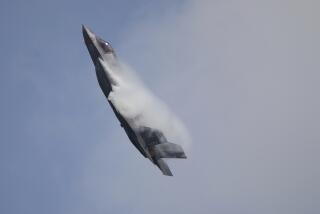Iraqi Pilot Says He Didn’t Hear Stark’s Warnings, Congress Told
- Share via
WASHINGTON — Iraq has told U.S. investigators that its pilot claims he did not hear any warnings from the frigate Stark before firing two Exocet missiles at the frigate, members of Congress were told by Pentagon officials Thursday.
Rep. Bill Nichols (D-Ala.), chairman of the investigations subcommittee of the House Armed Services Committee, told reporters after a briefing by officials representing the Joint Chiefs of Staff that the single French-built Mirage F-1 that launched the attack had been modified to carry two of the deadly missiles. The common version of the jet is capable of carrying only one Exocet.
Nichols said: “We’re given to understand it (the attack) did come from one plane. The plane was reconfigured to place a missile under each wing.” Nichols declined to say if the Navy was aware at the time that the Mirage could handle two of the missiles.
Among those who briefed Nichols’ panel and members of another Armed Services subcommittee in a closed session was the newly installed deputy chairman of the Joint Chiefs, Air Force Gen. Robert Herres.
“It’s our understanding that the Iraqi pilot has been interviewed and that he has given . . . to the Iraqis certain information as to what he heard or what he didn’t hear in the way of messages. And he claims that he never received a message from (the ship); he did not hear any message,” Nichols said.
The Stark twice tried to contact the pilot of the jet by radio to ask his intentions but never received a reply.
CBS News reported that Herres told the panel the Stark did not broadcast its first warning to stay away until 15 seconds after the pilot had fired the first of two Exocet missiles.
A team of Navy investigators headed by Rear Adm. David Rogers is in Baghdad probing the incident, which Iraq has said was a case of mistaken identity. The pilot evidently believed he was attacking an Iranian warship.
After a session with Iraqi defense officials that lasted until early Thursday, Rogers told reporters: “We’ve had differences of opinion along the way over the circumstances (of the attack), but we’ve ironed out most of them.
“A few differences remain and we hope to resolve them. . . . I’m not at liberty to talk about our differences, but we’re well on track, and at this point we’re very hopeful we’ll achieve the objectives we came over here for.”
Nichols said U.S. investigators also have learned that the first of the two missiles was fired when the attacking jet was 22 miles from the Stark and the second was turned loose some 70 seconds later, when the jet was about 15 miles from the Stark.
Thirty-seven sailors died as one of the warheads exploded. Nichols said it has not yet been determined whether it was the first or second missile to hit the ship.
Nichols said that Navy officials told the two panels “that all systems were working” on the Stark.
Meanwhile, military and diplomatic sources said Thursday that the Soviet Union has dispatched three minesweepers to the Persian Gulf, the Washington Post reported. The ships will join two Soviet frigates that have been operating in the gulf since the end of last year.
More to Read
Get the L.A. Times Politics newsletter
Deeply reported insights into legislation, politics and policy from Sacramento, Washington and beyond. In your inbox twice per week.
You may occasionally receive promotional content from the Los Angeles Times.










